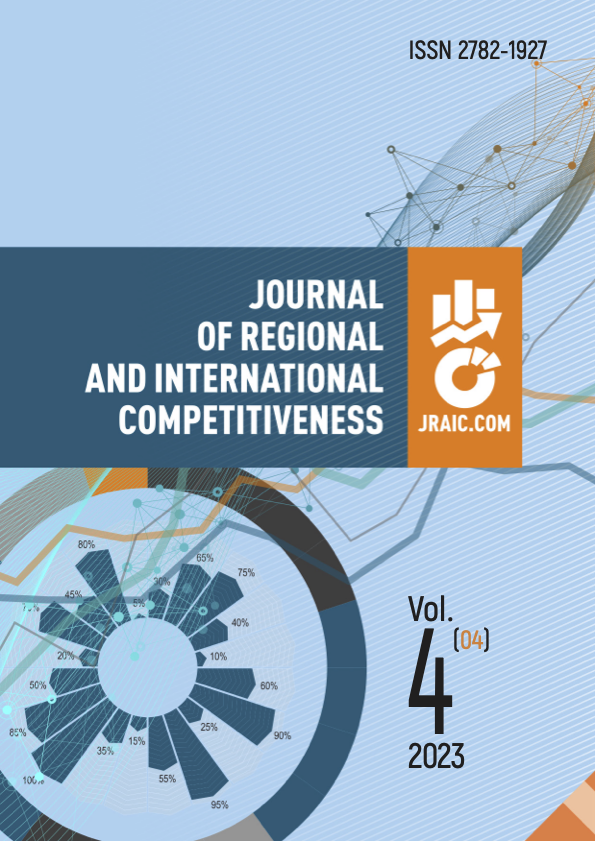Ivanovo, Ivanovo, Russian Federation
The formation of the Russian Federation digital sovereignty for the successful implementation of all stages of domestic industries digital transformation and enhancement of national competitiveness is impossible without the development of a support system based on the domestic hardware. The developed and efficient system of domestic electronic computer components production is the foundation of the national digital assets productivity. On the basis of the Federal State Statistics Service public official data, paper studies and analyses the relationship between three main economic indicators of the production process: investment in fixed capital, industrial production, the volume of shipped goods, works and services, in terms of «Manufacture of computers, electronic and optical products» as a type of economic activity for Ivanovo region and the Russian Federation. The study analyses a time period 2015-1st half 2023. To obtain objective results of the industrial digital development analysis of the Ivanovo region, the article additionally conducts a comprehensive analysis of the companies performance in terms of «Manufacture of computers, electronic and optical products» based on indicators of enterprises profitability. According to the research results, we determined state and trends of the digital industry in the Ivanovo region. Therefore, the industrial capabilities for hardware base development of electronic computer components and devices in the Ivanovo region is the key points of sustainable industrial diversification of regional economic system.
DIGITAL TRANSFORMATION, INVESTMENT, DEVELOPMENT, STRATEGY, INNOVATIVE DEVELOPMENT, INFORMATION TECHNOLOGY, DIGITAL SOVEREIGNTY
1. Bezrukov, A., Mamonov, M., Suchkov, M., & Sushentsov, A. (2021). Sovereignty and “digit”. The competition of technological platforms, or how to behave in the new world. Rossiya v global’noj politike, (2). DOI:https://doi.org/10.31278/1810-6439-2021-19-2-106-119. Retrieved from https://globalaffairs.ru/articles/suverenitet-i-czifra (accessed: 10.11.2023) (in Russian).
2. Efremov, A. A. (2017). Formation of the concept of information sovereignty of the state. Pravo: Zhurnal Vysshej shkoly ekonomiki, (1), 201-215 (in Russian).
3. Klochkova, N. V. (2021). Digital transformation of industries: starting conditions and priorities. In Teoreticheskie i prakticheskie aspekty cifrovizacii rossijskoj ekonomiki: sbornik trudov IV Mezhdunarodnoj nauchno-prakticheskoj konferencii, Yaroslavl’, 09 dekabrya 2021 goda. (pp. 92-97). Yaroslavl: Izdatel’stvo YAGTU (in Russian).
4. Savin, O. A. (2023). Trends and prospects for the development of the manufacturing industry in the Ivanovo region. In Innovacionnye podhody razvitiya ekonomiki: problemy, tendencii, perspektivy: Sbornik trudov Mezhdunarodnoj studencheskoj nauchno-prakticheskoj konferencii, Orel, 23–24 maya 2023 goda. (pp. 325-330). Orel: Orlovskij gosudarstvennyj agrarnyj universitet imeni N.V. Parahinoj (in Russian).
5. Brokes, F. (2018). Russia’s Sovereign Internet. Observer. Retrieved from https://.eu/cse-and-cis/russias-sovereign-internet/ (accessed: 09.11.2023) .
6. Kaloudis, M. (2021). Sovereignty in the Digital Age – How Can We Measure Digital Sovereignty and Support the EU’s Action Plan? New Global Studies, 16(3), 275-299; Padilla, M. (2017). Technological Sovereignty: What Are We Talking about? Technological Sovereignty. Barcelona: Descontrol, 2, 3-15. Retrieved from https://www.ritimo.org/IMG/pdf/sobtech2-en-with-covers-web-150dpi-2018-01-10.pdf (accessed 10.11.2023).



















